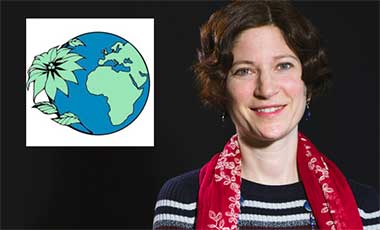Julia Steinberger
(Lead Author for the IPCC’s 6th Assessment Report):
Universal well-being within planetary boundaries
 Professor Julia Steinberger researches and teaches in the interdisciplinary areas of Ecological Economics and Industrial Ecology. Her research examines the connections between resource use (energy and materials, greenhouse gas emissions) and societal performance (economic activity and human wellbeing). She is interested in quantifying the current and historical linkages between resource use and socioeconomic parameters, and identifying alternative development pathways to guide the necessary transition to a low carbon society. She is the recipient of a Leverhulme Research Leadership Award for her research project ‘Living Well Within Limits’ investigating how universal human well-being might be achieved within planetary boundaries.
Professor Julia Steinberger researches and teaches in the interdisciplinary areas of Ecological Economics and Industrial Ecology. Her research examines the connections between resource use (energy and materials, greenhouse gas emissions) and societal performance (economic activity and human wellbeing). She is interested in quantifying the current and historical linkages between resource use and socioeconomic parameters, and identifying alternative development pathways to guide the necessary transition to a low carbon society. She is the recipient of a Leverhulme Research Leadership Award for her research project ‘Living Well Within Limits’ investigating how universal human well-being might be achieved within planetary boundaries.
https://www.youtube.com/watch?v=QkFjGoXW-fI
Prof. Steinberger is Professor of Societal Challenges of Climate Change at the University of Lausanne since 2020. Before that, she worked at the University of Leeds, and was a Senior Researcher at the Institute of Social Ecology in Vienna (SEC), where she investigated sustainable cities and the links between material use and economic performance. She has held postdoctoral positions at the Universities of Lausanne and Zurich, and obtained her PhD from the Massachusetts Institute of Technology. She has published over 40 internationally peer-reviewed articles since 2009 in journals including Nature Climate Change, Nature Sustainability, WIRES-Climate Change, Environmental Science & Technology, PLOS ONE and Environmental Research Letters. Talk: The ultimate engineering challenge: universal well-being within planetary boundaries This seminar will report on several streams of research within the “Living Well Within Limits” project. The Living Well Within Limits project investigates the energy requirements of well-being, from quantitative, participatory and provisioning systems perspectives. In this presentation, I will communicate individual and cross-cutting findings from the project, and their implications for the engineering research community. In particular, I will share our most recent results on the international distribution of energy footprints by country, consumption category, and income classes, as well as modelling the minimum energy demand that would provide decent living standards for everyone on earth by 2050. I will show that achieving low-carbon well-being, both from the beneficiary (“consumer”) and supply-chain (producer) sides, involves strong distributional and political elements. Simply researching this area from a technical, social or economic lens is insufficient to draw out the reasons for poor outcomes and most promising avenues for positive change. I thus argue for the active engagement of the research community.
Επίσης, το πολύ ενδιαφέρον βίντεο της συζήτησης (στα γαλλικά)
του Daniel Tanuro με την Julia Steinberger:
https://www.facebook.com/

